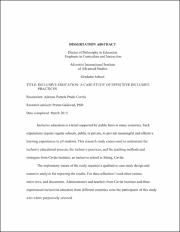| dc.description.abstract | Inclusive education is a trend supported by public laws in many countries. Such stipulations require regular schools, public or private, to provide meaningful and effective learning experiences to all students. This research study endeavored to understand the inclusive educational process, the inclusive practices, and the teaching methods and strategies from Cavite Institute, an inclusive school in Silang, Cavite. The exploratory nature of the study required a qualitative case study design and narrative analysis for reporting the results. For data collection I used observations, interviews, and documents. Administrators and teachers from Cavite Institute and three experienced inclusivist educators from different countries were the participants of this study who where purposively selected. ii Findings indicated that Cavite Institute provides the five dimensions of inclusive education (physical, pedagogical, social, emotional, and behavioral). They exhibit inclusive school culture, safe inclusive environment, organized and planned classes, and teachers positive attitudes toward inclusive education. They also promote creative and collaborative teaching methods and strategies based on cooperative learning, multiple intelligences theory, students learning styles, collaborative, and other participatory activities. The evaluative process is flexible based on formative and summative evaluation. Administrators provide support for the elaboration of students individualized education programs and training for teachers. Conclusions, based on the findings, indicate that inclusive schools provide the five dimensions of inclusion. They also provide support and training for teachers, and nurture that results in teachers positive attitudes and encouragement that promote collaborative teaching practices. Moreover, inclusive schools implement the building principal principle where the principal becomes a supporter, providing the needed help and motivation for the effective inclusive teaching. And inclusive teachers implement the pedagogy of diversity for delivering creative, collaborative, and practical learning. Finally, this study suggests an exemplary teaching model based on multiple intelligences teaching methods, cooperative learning strategies, technological tools, co-teaching, and varied teaching strategies beneficial for inclusive schools as well as all regular schools. | en_US |

